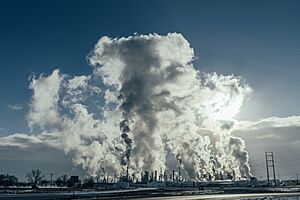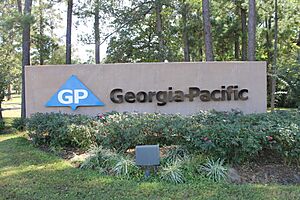Koch, Inc. facts for kids
| Private | |
| Industry | Conglomerate |
| Founded | February 8, 1940 |
| Founder | Fred C. Koch |
| Headquarters |
,
U.S.
|
|
Area served
|
Worldwide |
|
Key people
|
Charles Koch (chairman & co-CEO) Dave Robertson (co-CEO & vice chairman) Jim Hannan (president & COO) |
| Products | Asphalt, chemicals, raw materials trading, energy, fibers, fertilizers, finance, minerals, natural gas, plastics, petroleum, pulp and paper, ranching |
| Revenue | US$125 billion (2021) |
| Owner | Charles Koch (42%) Heirs of David Koch (42%) Trusts for the benefit of Elaine Tettemer Marshall, Preston Marshall, and E. Pierce Marshall Jr. (16%) |
|
Number of employees
|
120,000 (2022) |
| Subsidiaries |
|
Koch, Inc. is a very large American company based in Wichita, Kansas. It's one of the biggest private companies in the United States. This means it's not owned by lots of different people who buy shares on the stock market, but by a smaller group of owners.
Koch, Inc. is involved in many different types of businesses. Its companies make, refine, and distribute things like petroleum (oil), chemicals, energy, fibers, fertilizers, and pulp and paper. They also work with minerals, natural gas, and plastics. Koch, Inc. has about 122,000 employees in 60 countries around the world.
The company was started by Fred C. Koch in 1940. He created a new way to refine crude oil. After he passed away in 1967, his four sons inherited parts of the company. Over time, Charles Koch and David Koch became the main owners. Today, Charles Koch and the family of David Koch are the primary owners. Charles Koch has said that the company will stay private, allowing it to focus on long-term growth.
History
How the Company Started
In 1925, Fred C. Koch joined a company in Wichita, Kansas, which later became the Winkler-Koch Engineering Company. In 1927, they developed a better way to turn crude oil into gasoline. This new method was very popular with smaller oil refineries in the United States.
However, bigger oil companies sued them, saying they copied their ideas. Because of this, Winkler-Koch started working in other countries, including the Soviet Union. They built 15 oil refining units there between 1929 and 1932. Fred Koch did not like the government in the Soviet Union, describing it as a "land of hunger, misery, and terror."
In the 1930s, Winkler-Koch built refineries in many different countries. In 1933, Fred Koch helped design and build a large oil refinery in Germany. This refinery was important because it could make fuel for airplanes. Later, during World War II, this refinery became a target for Allied forces. Koch's business and family supported the American efforts against Adolf Hitler's government during the war.
In 1940, Fred Koch started a new company called Wood River Oil and Refining Company. This company later bought the Rock Island refinery in Oklahoma. In 1961, Charles Koch, Fred's son, joined the company. He became president in 1966 and chairman in 1967 after his father passed away.
Becoming Koch Industries
In 1968, Wood River Oil and Refining Company was renamed Koch Industries to honor Fred Koch. At that time, it was mainly an engineering company that also owned part of Great Northern Oil Company, which had the Pine Bend Refinery in Minnesota, an oil-gathering system, and some cattle ranches.
Charles Koch worked to buy more of Great Northern Oil Company. By 1969, Koch Industries owned 50% of the company, and soon after, they bought the rest. The Pine Bend Refinery made many products like chemicals, fibers, plastics, and asphalt.
In 1970, Charles's brother, David Koch, joined the company. David became president of Koch Engineering in 1979. In 1979, the company also bought 780 car dealerships from Chrysler.
In 1983, there were disagreements among the Koch brothers about how the company should be run and how much money should be paid out to owners. As a result, William "Bill" Koch and Frederick R. Koch sold their shares in the company. This made Charles Koch and David Koch the main owners.
Over the years, Koch Industries continued to grow by buying other companies. In 2001, they bought KoSa, which was a large producer of polyester. In 2005, they acquired Georgia-Pacific, a huge company that makes paper and building materials. In 2013, they bought Molex, a company that makes electronic parts.
In 2014, Koch Industries and Goldman Sachs bought Flint Group, a company that makes printing ink. Also in 2014, Koch Industries and the Charles Koch Foundation gave $25 million to the United Negro College Fund to help students get scholarships.
In 2015, Koch Industries joined the "Ban the Box" movement. This means they removed questions about past criminal convictions from their job applications, making it easier for people with past mistakes to find work.
In 2017, Koch Disruptive Technologies was started. This is a part of the company that invests in new and innovative technologies. In 2021, a ranch owned by Matador Cattle Company, a Koch subsidiary, was sold for $200 million.
In March 2023, Koch Industries changed its leadership structure. Charles Koch remained chairman and became co-CEO with Dave Robertson. Jim Hannan was named President and COO. In 2024, the company changed its name to Koch, Inc. to show that it does business in many different areas.
Subsidiaries
A subsidiary is a company that is owned or controlled by another, larger company. Koch, Inc. owns many different subsidiaries.
Infor
Koch, Inc. invested a lot of money in Infor, a company that focuses on cloud computing. Cloud computing means storing and accessing data and programs over the internet instead of on your computer's hard drive. Koch, Inc. fully acquired Infor in 2020.
Arteva Europe S.a.r.l.
Arteva Europe is like an "internal bank" for Koch, Inc. in Europe. It helps manage the company's money flow in that region.
Flint Hills Resources LP
Flint Hills Resources LP is a company that refines oil and makes chemicals. It sells gasoline, diesel, jet fuel, and other chemical products. It operates oil refineries and chemical plants in several states. The company also makes asphalt for roads and roofs.
The Pine Bend Refinery in Minnesota is very large and can process a lot of crude oil every day, much of it coming from Canada. Flint Hills Resources also manages the buying of crude oil and operates ethanol plants.
Koch Pipeline Company LP
Koch Pipeline Company LP is part of Flint Hills Resources. It owns and operates over 4,000 miles (6,400 km) of pipelines. These pipelines are used to transport petroleum, natural gas liquids, and chemicals across several states and into Canada.
Georgia-Pacific
Georgia-Pacific is one of America's largest companies that works with forest products. They specialize in pulp and paper and building materials.
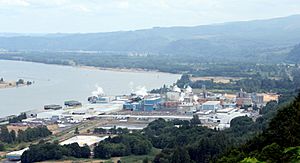
Georgia-Pacific makes many household products like Brawny paper towels, Angel Soft toilet paper, and Dixie cups. Koch, Inc. fully acquired Georgia-Pacific in 2005, and it operates as an independent company under Koch.
Guardian Industries
Guardian Industries makes glass and products for cars and buildings. They make flat glass and special glass products for homes, businesses, and vehicles. The company has operations in many parts of the world.
Invista
Invista is a company that makes polymers and fibers. They are known for products like "Stainmaster" carpets. Koch, Inc. bought Invista from DuPont in 2003.
Koch Ag & Energy Solutions
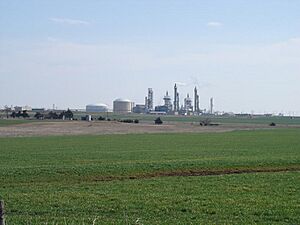
Koch Ag & Energy Solutions, or KAES, provides products like fertilizer and other plant nutrients for farms and gardens. They also offer products and technology for the energy and chemical markets.
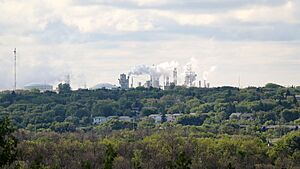
Koch Fertilizer, which is part of KAES, is one of the world's largest makers of nitrogen fertilizers. They own or have interests in fertilizer plants in many countries.
Koch Chemical Technology Group
Koch Chemical Technology Group designs, makes, and installs equipment for industrial processes and for controlling pollution. They also provide equipment for cleaning water and turning saltwater into fresh water.
Koch-Glitsch
Koch-Glitsch is a part of Koch, Inc. that designs equipment for refineries and chemical plants. They help these plants work more efficiently and safely.
Koch Minerals
Koch Minerals works with large amounts of dry materials like minerals. They are also involved in finding and producing oil and gas, and making products for oil fields.
Koch Supply & Trading
Koch Supply & Trading companies around the world buy and sell things like crude oil, refined petroleum products, natural gas, and other energy sources.
Molex
Molex makes electronic parts like connectors and sensors. These parts are used in many different technologies, including data transmission, telecommunications, solar power, cars, and health technology.
Environmental and Safety Efforts
Koch, Inc. has faced some challenges related to the environment and safety. The company has had to pay fines and make improvements to its operations.
- In the past, there were incidents where pipelines broke, causing oil to spill into waterways.
- There was also an incident where a pipeline carrying gas ruptured, leading to an accident and an investigation.
- The company has also faced issues regarding the proper disposal of wastewater and emissions from its plants.
In response to these issues, Koch, Inc. has worked with government agencies to improve its leak-prevention programs and install better pollution-control equipment at its facilities. The company has also been recognized for its efforts in conservation. For example, Koch, Inc. won the 2015 Conservation Education Award from the Wildlife Habitat Council for its work on conservation projects.
Political Activity
Koch, Inc. and its leaders are also involved in political activities.
- Fred C. Koch, the founder, was involved with the John Birch Society, a group that was against communism.
- His son, Charles Koch, helped start the Cato Institute, which is a group that promotes ideas about free markets and limited government.
- The company also has a political action committee called KochPAC, which contributes to political campaigns.
Koch, Inc.'s contributions often support ideas about taxes, energy, and financial rules. Some environmental groups, like Greenpeace, have expressed concerns about the company's influence on climate change policies.
The company has spoken out against certain government rules, such as those that limit greenhouse gases or regulate financial products. Charles Koch has explained that the company speaks out to support politicians who are working on important issues like government spending.
See also
 In Spanish: Koch Industries para niños
In Spanish: Koch Industries para niños
- Energy in the United States
- Koch family
- List of largest companies by revenue
- Petrochemical industry
- Petroleum in the United States
 | Aaron Henry |
 | T. R. M. Howard |
 | Jesse Jackson |


